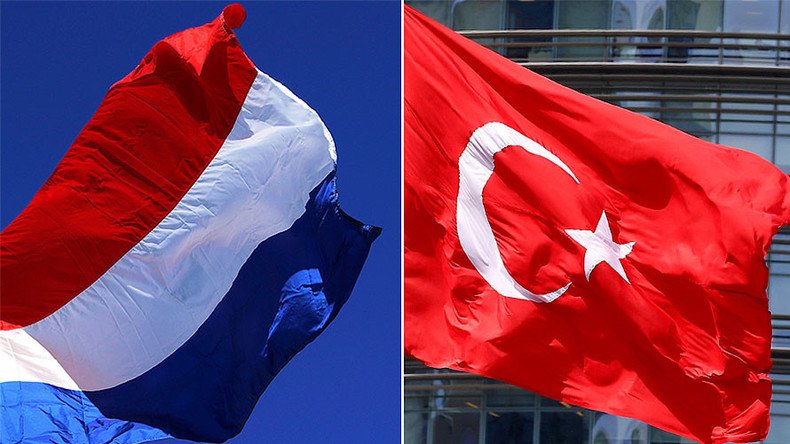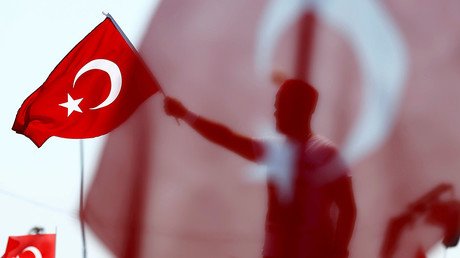Netherlands vows to resist Turkey’s ‘long arm’ in internal affairs after diplomatic row

The Netherlands has stressed it will resist any attempts by Ankara to meddle in its internal affairs, after Dutch media reported that a Turkish embassy employee sent home a list of alleged Dutch supporters of the failed Turkish coup.
Dutch Foreign Minister Bert Koenders summoned the Turkish ambassador to The Hague and demanded an explanation of reports that surfaced in the Dutch media. The reports said a Turkish embassy employee compiled a list of people he deemed to be supporters of the exiled US-based Turkish cleric Fethullah Gulen, whom Ankara accuses of being behind the failed July 15 coup in Turkey.
"We're going to ask for clarification about this," Koenders said, as cited by Reuters. “In addition, we are going to engage with the Turkish authorities and the Diyanet [Turkish religious affairs watchdog] organization in Ankara. That's part of our policy of challenging every incident that concerns the ‘long arm’ with our Turkish counterparts," he said.
The report on this issue was published in the Dutch De Telegraaf newspaper on Wednesday. It featured an interview with the embassy employee in question, who admitted collecting the names of people living in the Netherlands who sympathize with the Gulenist movement, and then passing the information on to the Turkish authorities.
The man, Yusuf Acar, is both an attaché at the Turkish embassy and the chairman of the Dutch branch of the Diyanet. He told De Telegraaf that he obtained all the necessary information from open sources.
"As attaché I collected information that anyone can find on the internet," he said, adding that he acted alone and that no imams from Diyanet-affiliated mosques were involved.
Koenders called the report “worrying” and said that “if true, that means the combination of a diplomatic status with the chairmanship of the Diyanet is problematic,” as reported by Reuters.
Earlier, when the initial rumors of such activities by Turkish officials first started circulating in the Netherlands, both the Diyanet and the Turkish embassy denied any involvement in “collecting information on Gulenist sympathizers.”
In early December, Turkish media reported that the Diyanet had gathered intelligence on Gulen supporters in 37 countries across Europe and Asia as well as in Australia.
The Directorate of Religious Affairs used reports from imams, mosque officials, religious coordinators and religious services counselors in its work, the media said.
On December 9, the embassy issued a statement in which it called the accusations against the Turkish officials “absolutely incorrect.” On Wednesday, after the investigative report was published in De Telegraaf, the Turkish embassy said it was “embarrassed” by the news and added that Acar acted “out of sight of the ambassador,” Dutch media outlet Nieuws.nl reported.
The Dutch Diyanet branch also said that Acar “has serious problems” with the other board members because of his actions.
Meanwhile, the information presented in the report also sparked a wave of condemnation from several Dutch politicians. The leader of the Dutch center-right Christian Democratic Appeal Party, Sybrand Buma, called the actions of the Turkish official “bizarre and unacceptable interference” after it turned out that his party was mentioned in the list as one of the “Gulenist strongholds,” according to Dutch broadcaster RTL Nieuws.
"The allegations are ridiculous and false. They show how far the propaganda from Ankara reaches. Again it is clear that the Turkish government is trying mess with Dutch relations. The government should call the ambassador to account,” Buma said.
At the same time, Dutch State Secretary for Social Affairs Jetta Klijnsma called on people who feel intimidated by the Diyanet to report it to the police, nltimes.nl reports.
This is not the first time Turkey and the Netherlands have become involved in a political spat. In August, Koenders demanded that Turkey refrain from meddling in the Netherlands’ internal affairs, after the Turkish council sent a letter to Dutch mayors instructing them on how to control anti-Ankara sentiment following July’s failed coup.
Turkish Consul General Sadin Ayyildiz instructed the mayors how they should curb protests organized by Ankara’s opponents and called for action against what he called the Gulenist terrorist group.
In April, the Turkish consulate in the Netherlands allegedly called on local Turks to report those who insult President Erdogan, sparking outrage among some Dutch lawmakers, who said the “long arm of Erdogan” was reaching into the Netherlands. Ankara later called the appeal “a mistake.”
Turkey launched a massive crackdown spanning all levels of society after a failed attempt to topple the government on July 15. Turkish authorities have since detained almost 38,000 people and fired more than 100,000 employees from government jobs.















